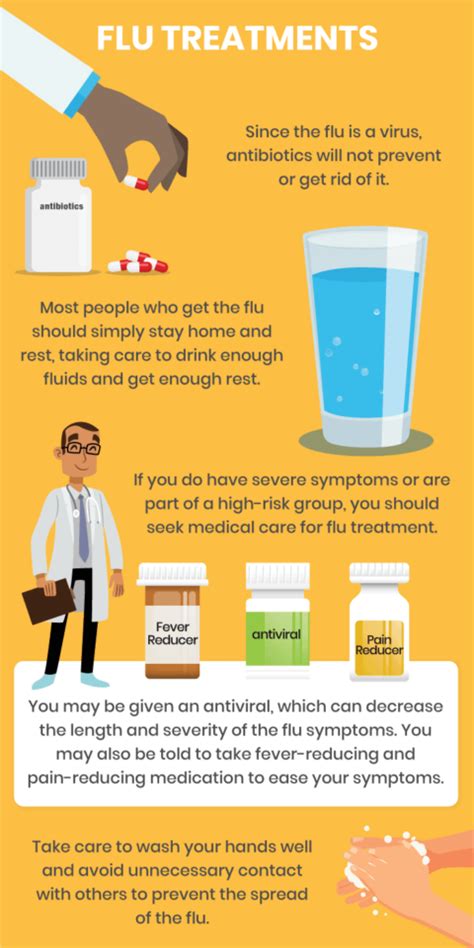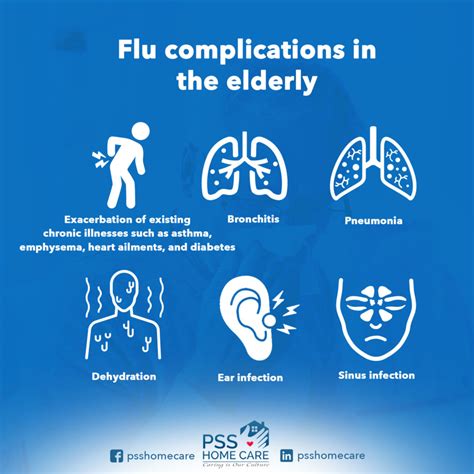Intro
Discover effective flu treatment options, including antiviral meds, home remedies, and natural therapies to alleviate symptoms and prevent complications, promoting rapid recovery from influenza.
The flu, also known as influenza, is a highly contagious respiratory illness that can affect anyone, regardless of age or health status. It is estimated that the flu affects millions of people worldwide each year, resulting in significant morbidity and mortality. The importance of understanding flu treatment options cannot be overstated, as it can help alleviate symptoms, reduce the risk of complications, and prevent the spread of the disease. In this article, we will delve into the various flu treatment options available, including medications, home remedies, and preventive measures.
The flu can be a debilitating illness, causing symptoms such as fever, cough, sore throat, and body aches. If left untreated, the flu can lead to serious complications, such as pneumonia, bronchitis, and sinus infections. Furthermore, certain groups, including the elderly, young children, and people with underlying health conditions, are at a higher risk of developing severe flu-related complications. Therefore, it is essential to seek medical attention if symptoms persist or worsen over time. A healthcare professional can diagnose the flu and recommend the most effective treatment options.
The flu is a highly contagious disease, and its transmission can be prevented through simple measures, such as frequent handwashing, wearing a mask, and avoiding close contact with infected individuals. Additionally, getting vaccinated against the flu is one of the most effective ways to prevent the disease. The flu vaccine is available in various forms, including injectable and nasal spray, and is recommended for everyone six months and older. By understanding the importance of flu prevention and treatment, individuals can take proactive steps to protect themselves and their loved ones from this debilitating illness.
Medications for Flu Treatment

There are several medications available for flu treatment, including antiviral medications, pain relievers, and decongestants. Antiviral medications, such as oseltamivir (Tamiflu) and zanamivir (Relenza), are specifically designed to target the flu virus, reducing the severity and duration of symptoms. These medications are most effective when taken within 48 hours of symptom onset and can help alleviate symptoms such as fever, cough, and body aches. Pain relievers, such as acetaminophen (Tylenol) and ibuprofen (Advil), can help reduce fever and alleviate body aches, while decongestants, such as pseudoephedrine (Sudafed), can help relieve congestion and sinus pressure.
Types of Antiviral Medications
Antiviral medications are the primary treatment for the flu, and they work by inhibiting the replication of the flu virus. There are several types of antiviral medications available, including: * Oseltamivir (Tamiflu): This medication is available in capsule and liquid form and is approved for use in individuals one year and older. * Zanamivir (Relenza): This medication is available in inhaler form and is approved for use in individuals seven years and older. * Peramivir (Rapivab): This medication is available in injection form and is approved for use in individuals two years and older. * Amantadine (Symmetrel): This medication is available in capsule and liquid form and is approved for use in individuals one year and older.Home Remedies for Flu Treatment

In addition to medications, there are several home remedies that can help alleviate flu symptoms. These remedies include:
- Rest and relaxation: Getting plenty of rest can help the body recover from the flu.
- Hydration: Drinking plenty of fluids, such as water, clear broths, and electrolyte-rich beverages, can help replace lost fluids and electrolytes.
- Warm compresses: Applying a warm compress to the forehead, nose, and chest can help relieve congestion and sinus pressure.
- Humidifiers: Using a humidifier can help add moisture to the air, relieving congestion and cough.
- Saline nasal sprays: Using a saline nasal spray can help moisturize the nasal passages and relieve congestion.
Natural Remedies
There are several natural remedies that can help alleviate flu symptoms, including: * Honey: Honey has antimicrobial and anti-inflammatory properties, making it an effective cough suppressant. * Ginger: Ginger has anti-inflammatory properties, making it an effective remedy for nausea and vomiting. * Echinacea: Echinacea is an herb that has been shown to have immunomodulatory effects, helping to boost the immune system. * Vitamin C: Vitamin C is an antioxidant that can help boost the immune system and reduce the severity of flu symptoms.Preventive Measures

Preventing the flu is an essential aspect of flu treatment, and there are several measures that can be taken to reduce the risk of transmission. These measures include:
- Getting vaccinated: Getting vaccinated against the flu is one of the most effective ways to prevent the disease.
- Practicing good hygiene: Frequent handwashing, wearing a mask, and avoiding close contact with infected individuals can help prevent the transmission of the flu.
- Avoiding close contact: Avoiding close contact with individuals who have the flu can help reduce the risk of transmission.
- Cleaning and disinfecting: Cleaning and disinfecting surfaces and objects can help reduce the risk of transmission.
Vaccination
Vaccination is an essential aspect of flu prevention, and there are several types of flu vaccines available, including: * Trivalent vaccine: This vaccine protects against three strains of the flu virus. * Quadrivalent vaccine: This vaccine protects against four strains of the flu virus. * Nasal spray vaccine: This vaccine is a live, attenuated vaccine that is administered via nasal spray. * High-dose vaccine: This vaccine is a higher-dose vaccine that is designed for individuals 65 years and older.Complications of the Flu

The flu can lead to several complications, including:
- Pneumonia: Pneumonia is a serious infection that can develop as a result of the flu.
- Bronchitis: Bronchitis is an inflammation of the bronchial tubes that can develop as a result of the flu.
- Sinus infections: Sinus infections can develop as a result of the flu, causing symptoms such as congestion, headache, and facial pain.
- Ear infections: Ear infections can develop as a result of the flu, causing symptoms such as ear pain, fever, and hearing loss.
High-Risk Groups
Certain groups are at a higher risk of developing severe flu-related complications, including: * Older adults: Older adults are at a higher risk of developing severe flu-related complications due to age-related declines in immune function. * Young children: Young children are at a higher risk of developing severe flu-related complications due to their immature immune systems. * People with underlying health conditions: People with underlying health conditions, such as heart disease, lung disease, and diabetes, are at a higher risk of developing severe flu-related complications.Conclusion and Next Steps

In conclusion, flu treatment options are varied and depend on the severity of symptoms and the individual's overall health. By understanding the importance of flu prevention and treatment, individuals can take proactive steps to protect themselves and their loved ones from this debilitating illness. If you or a loved one is experiencing flu symptoms, it is essential to seek medical attention to determine the best course of treatment. Additionally, taking preventive measures, such as getting vaccinated and practicing good hygiene, can help reduce the risk of transmission.
We invite you to share your thoughts and experiences with flu treatment options in the comments below. Have you or a loved one had the flu? What treatment options did you use? What preventive measures do you take to reduce the risk of transmission? Share your story and help others understand the importance of flu prevention and treatment.
What are the symptoms of the flu?
+The symptoms of the flu include fever, cough, sore throat, body aches, and fatigue. In some cases, the flu can also cause vomiting, diarrhea, and abdominal pain.
How is the flu diagnosed?
+The flu is typically diagnosed based on symptoms and physical examination. In some cases, a healthcare professional may perform a rapid influenza diagnostic test to confirm the diagnosis.
What are the best ways to prevent the flu?
+The best ways to prevent the flu include getting vaccinated, practicing good hygiene, avoiding close contact with infected individuals, and cleaning and disinfecting surfaces and objects.
Can the flu be treated with antibiotics?
+No, the flu is caused by a virus and cannot be treated with antibiotics. Antibiotics are only effective against bacterial infections.
How long does the flu last?
+The flu typically lasts for 5-7 days, but in some cases, it can last for up to 2 weeks. In severe cases, the flu can lead to complications, such as pneumonia, which can last for several weeks or even months.
